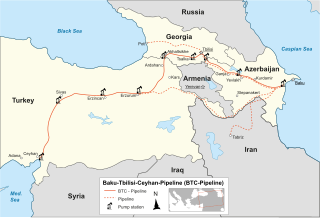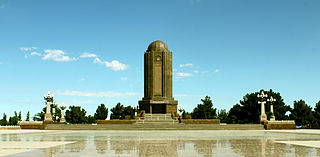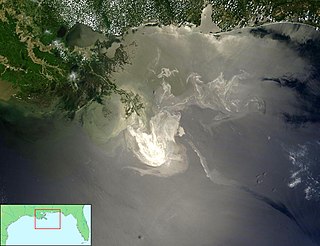Related Research Articles

Amoco is a brand of fuel stations operating in the United States and owned by British conglomerate BP since 1998. The Amoco Corporation was an American chemical and oil company, founded by Standard Oil Company in 1889 around a refinery in Whiting, Indiana, and was officially the Standard Oil Company of Indiana until 1985. Originally part of the Standard Oil Company trust, it focused on producing gasoline for the new automobile market. In 1911, as part of the break-up of the Standard Oil trust, it became an independent corporation. Incorporated in Indiana, it was headquartered in Chicago, and formally adopted the name Amoco in 1985. Although the Amoco Corporation merged in 1998 into BP Amoco, the Amoco name was resurrected in 2017 as a brand that service station owners could choose to use when they purchased supplies from BP in selected areas of the United States.

Tate is an institution that houses, in a network of four art galleries, the United Kingdom's national collection of British art, and international modern and contemporary art. It is not a government institution, but its main sponsor is the UK Department for Culture, Media and Sport.

Kenule Beeson "Ken" Saro-Wiwa was a Nigerian writer, television producer, and environmental activist. Ken Saro-Wiwa was a member of the Ogoni people, an ethnic minority in Nigeria whose homeland, Ogoniland, in the Niger Delta, has been targeted for crude oil extraction since the 1950s and has suffered extreme environmental damage from decades of indiscriminate petroleum waste dumping.

The Baku–Tbilisi–Ceyhan (BTC) pipeline is a 1,768 kilometres (1,099 mi) long crude oil pipeline from the Azeri–Chirag–Gunashli oil field in the Caspian Sea to the Mediterranean Sea. It connects Baku, the capital of Azerbaijan and Ceyhan, a port on the south-eastern Mediterranean coast of Turkey, via Tbilisi, the capital of Georgia. It is the second-longest oil pipeline in the former Soviet Union, after the Druzhba pipeline. The first oil that was pumped from the Baku end of the pipeline reached Ceyhan on 28 May 2006.
The year 1947 in architecture involved some significant events.
The Movement for the Survival of the Ogoni People (MOSOP), is a social movement organization representing the indigenous Ogoni people of Rivers State, Nigeria. The Ogoni contend that Shell Petroleum Development Company (SPDC), along with other petroleum multinationals and the Nigerian government, have destroyed their environment, polluted their rivers, and provided no benefits in return for enormous oil revenues extracted from their lands.

Sir Nicholas Andrew Serota,, is an English art historian and curator, who served as the Director of the Tate from 1988 to 2017. He is currently Chair of Arts Council England, a role which he has held since February 2017.

The Nizami Mausoleum, built in honor of the 12th-century Persian poet Nizami Ganjavi, stands just outside the city of Ganja, Azerbaijan. The mausoleum was originally built in 1947 in place of an old collapsed mausoleum, and rebuilt in its present form in 1991.

The Ogonis are a people in the Rivers South East senatorial district of Rivers State, in the Niger Delta region of southern Nigeria. They number just over 2 million and live in a 1,050-square-kilometre (404-square-mile) homeland which they also refer to as Ogoniland. They share common oil-related environmental problems with the Ijaw people of the Niger Delta.

The current conflict in the Niger Delta first arose in the early 1990s over tensions between foreign oil corporations and a number of the Niger Delta's minority ethnic groups who feel they are being exploited, particularly the Ogoni and the Ijaw. Ethnic and political unrest continued throughout the 1990s despite the return to democracy and the election of the Obasanjo government in 1999. Struggle for oil wealth and environmental harm over its impacts has fueled violence between ethnic groups, causing the militarization of nearly the entire region by ethnic militia groups, Nigerian military and police forces, notably the Nigerian Mobile Police. The violence has contributed to Nigeria's ongoing energy supply crisis by discouraging foreign investment in new power generation plants in the region.

Monday Owens Wiwa is a medical doctor and human rights activist. He is the brother of executed Ogoni leader Ken Saro-Wiwa, and the son of Ogoni chief Jim Wiwa. Wiwa is an internationally renowned expert on the effects of globalisation, especially as it relates to the highly controversial business practices of Royal Dutch Shell in the Niger Delta. Vice-chairman of the Toronto chapter of the Sierra Club Canada and an active member of Amnesty International, Wiwa is frequently called upon to advocate for development programs in Canada and abroad and to campaign for increased corporate responsibility. This work has taken him to Ireland, which he visits in support of the Shell to Sea campaign. Currently, he is the Global Vice President Human Resource for Health, Director for West Africa and Central Africa and Country Director, Nigeria for Clinton Health Access Initiative.

The Baku–Novorossiysk pipeline is an 1,330-kilometre (830 mi) long oil pipeline, which runs from the Sangachal Terminal near Baku to the Novorossiysk terminal at the Black Sea coast in Russia. The Azerbaijani section of the pipeline is operated by the State Oil Company of Azerbaijan Republic (SOCAR) and the Russian section is operated by Transneft.

BP p.l.c. is a British multinational oil and gas company headquartered in London, England. It is one of the oil and gas "supermajors" and one of the world's largest companies measured by revenues and profits. It is a vertically integrated company operating in all areas of the oil and gas industry, including exploration and extraction, refining, distribution and marketing, power generation, and trading.
The Wiwa- family lawsuits against Royal Dutch Shell were three separate lawsuits brought in 1996 by the family of Ken Saro-Wiwa against Royal Dutch Shell, its subsidiary Shell Nigeria and the subsidiary's CEO Brian Anderson. Charges included human rights abuses against the Ogoni people in the Niger Delta, summary execution, torture, arbitrary arrest, and wrongful death. After 12 years of Shell petitioning the court not to hear the cases, they were heard 26 May 2009.
Zina Saro-Wiwa is a Brooklyn-based video artist and filmmaker. She makes video installations, documentaries, music videos and experimental films.

The Deepwater Horizon oil spill was an industrial disaster that began on 20 April 2010 off of the coast of the United States in the Gulf of Mexico on the BP-operated Macondo Prospect, considered to be the largest marine oil spill in the history of the petroleum industry and estimated to be 8 to 31 percent larger in volume than the previous largest, the Ixtoc I oil spill, also in the Gulf of Mexico. The United States federal government estimated the total discharge at 4.9 MMbbl. After several failed efforts to contain the flow, the well was declared sealed on 19 September 2010. Reports in early 2012 indicated that the well site was still leaking. The Deepwater Horizon oil spill is regarded as one of the largest environmental disasters in world history.

The Deepwater Horizon drilling rig explosion was an April 20, 2010 explosion and subsequent fire on the Deepwater Horizon semi-submersible mobile offshore drilling unit, which was owned and operated by Transocean and drilling for BP in the Macondo Prospect oil field about 40 miles (64 km) southeast off the Louisiana coast. The explosion and subsequent fire resulted in the sinking of the Deepwater Horizon and the deaths of 11 workers; 17 others were injured. The same blowout that caused the explosion also caused an oil well fire and a massive offshore oil spill in the Gulf of Mexico, considered the largest accidental marine oil spill in the world, and the largest environmental disaster in United States history.
Liberate Tate is an art collective exploring the role of creative intervention in social change. The group aims to "free art from oil" with a primary focus on the art museum Tate ending its corporate sponsorship with BP. Liberate Tate has become internationally renowned for artworks about the relationship of public cultural institutions with oil companies. In 2016 Liberate Tate won its campaign with the announcement that BP sponsorship of Tate would come to an end in 2017.

Black November: Struggle for the Niger Delta is a 2012 Nigerian-American action drama film starring an ensemble cast that includes Hakeem Kae-Kazim, Mickey Rourke, Kim Basinger, Fred Amata, Sarah Wayne Callies, Nse Ikpe Etim, OC Ukeje, Vivica Fox, Anne Heche, Persia White, Akon, Wyclef Jean and Mbong Amata. It is directed and co-produced by Jeta Amata, and narrates the story of a Niger Delta community's struggle against their government and a multi-national oil corporation to save their environment which is being destroyed by excessive oil drilling.
Richard Marriott, CVO, TD, FSA was a banker, stockbroker, company director, and public administrator who served as Lord Lieutenant of the East Riding of Yorkshire from 1996 to 2005.
References
- ↑ "Green Museum". Archived from the original on 16 June 2010. Retrieved 22 April 2009.
- ↑ Unearthing the Effra
- ↑ Platform London
- ↑ Terry Macalister, "The Oil Road: Journeys from the Caspian Sea to the City of London by James Marriott and Mika Minio-Paluello - review", The Guardian , 14 December 2012.
- ↑ The Next Gulf - Constable & Robinson
- ↑ "Launch of a book: Some Common Concerns - Imagining BP's Azerbaijan-Georgia-Turkey Pipelines". Archived from the original on 2 December 2013. Retrieved 25 November 2013.
- ↑ James Marriott - Schumacher College. Retrieved 25 November 2013.
- ↑ "BP pledges £10m art sponsorship", BBC News, 19 December 2011.
- ↑ Jonathan Jones, "Tate is right to take BP's money", The Guardian, 29 June 2010.
- ↑ Julia Weiner, Interview - Sir Nicholas Serota, The Jewish Chronicle , 8 July 2010.
- ↑ "Remembering Ken Saro-Wiwa". The Guardian. London. Retrieved 7 May 2010.
- ↑ "Remember Saro-Wiwa" on flickr.
- ↑ And While London Burns